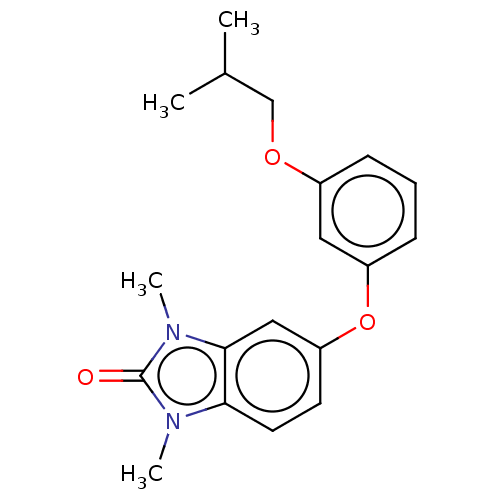

 Search and Browse
Search and Browse
 Download
Download
 Enter Data
Enter Data
BDBM50150800 CHEMBL3775687
SMILES: CC(C)COc1cccc(Oc2ccc3n(C)c(=O)n(C)c3c2)c1
InChI Key: InChIKey=VHGMYVXHAMPJTO-UHFFFAOYSA-N
| Target/Host (Institution) | Ligand | Target/Host Links | Ligand Links | Trg + Lig Links | Ki nM | ΔG° kcal/mole | IC50 nM | Kd nM | EC50/IC50 nM | koff s-1 | kon M-1s-1 | pH | Temp °C |
|---|---|---|---|---|---|---|---|---|---|---|---|---|---|
| Transcription intermediary factor 1-alpha (Homo sapiens (Human)) | BDBM50150800 (CHEMBL3775687) | PDB KEGG UniProtKB/SwissProt GoogleScholar AffyNet | CHEMBL PC cid PC sid UniChem Similars | PubMed | n/a | n/a | 2.40E+3 | n/a | n/a | n/a | n/a | n/a | n/a |
The University of Texas MD Anderson Cancer Center Curated by ChEMBL | Assay Description Inhibition of KDM5C (unknown origin) using biotin-H3K4me3 as substrate preincubated for 15 mins followed by substrate addition measured after 20 mins... | J Med Chem 59: 1440-54 (2016) BindingDB Entry DOI: 10.7270/Q26975F4 | |||||||||||
| More data for this Ligand-Target Pair | |||||||||||||
| Transcription intermediary factor 1-alpha (Homo sapiens (Human)) | BDBM50150800 (CHEMBL3775687) | PDB KEGG UniProtKB/SwissProt GoogleScholar AffyNet | CHEMBL PC cid PC sid UniChem Similars | PubMed | n/a | n/a | n/a | n/a | >3.60E+4 | n/a | n/a | n/a | n/a |
The University of Texas MD Anderson Cancer Center Curated by ChEMBL | Assay Description Inhibition of human N-terminal His-tagged KDM4A (1 to 359 residues) expressed in Escherichia coli using biotin-H3K9me3 as substrate preincubated for ... | J Med Chem 59: 1440-54 (2016) BindingDB Entry DOI: 10.7270/Q26975F4 | |||||||||||
| More data for this Ligand-Target Pair | |||||||||||||